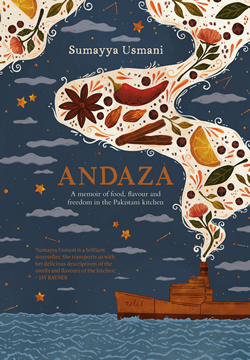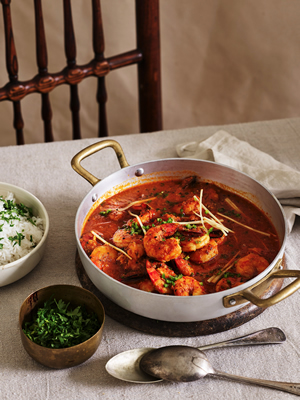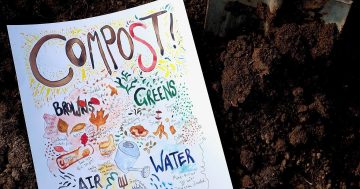By Christine Salins.
 The title of Pakistani cookbook cum memoir, Andaza, translates as ‘estimation’ which tells you something about the way Sumayya Usmani’s female role models cooked.
The title of Pakistani cookbook cum memoir, Andaza, translates as ‘estimation’ which tells you something about the way Sumayya Usmani’s female role models cooked.
“Both of my grandmothers, and my mother, cooked without recipes, recollecting and recreating meals using their senses,” Usmani writes in the introduction to Andaza, published by Murdoch Books (RRP $45).
“I grew up around this way of cooking, called andaza, which translates as ‘estimation’, but really encompasses what I like to think of as the art of sensory cooking.”
Usmani spent the first eight years of her life at sea, with a father who captained merchant ships and a mother who preferred to cook for the family herself on a tiny electric stove in their cabin rather than eat in the officers’ mess.
From a young age, food was Usmani’s portal to nurturing, love and self-expression. When the family moved to Karachi, she grew up torn between the social expectations of life as a young girl in Pakistan, and the inspiration she felt in the kitchen, watching her mother, and her Nani Mummy (maternal grandmother) and Dadi’s (paternal grandmother) cook.
All this family history is documented in the evocative and moving food memoir that is Andaza: A Memoir of Food, Flavour and Freedom in the Pakistani Kitchen. Interspersed with recipes from her childhood, Usmani tells how her self-belief grew, allowing her to find her own path between the expectations of following in her father’s footsteps as a lawyer and the pressures of a Pakistani woman’s presumed place in the household.
Gradually, through the warmth of her family life, the meaning of andaza comes to her: that the flavour and meaning of a recipe is not a list of measured ingredients, but a feeling in your hands, as you let the elements of a meal come together through instinct and experience.
Recipes include the delicious Saffron Black Cardamom Fudge that her mother cooked on board the ship, her mother’s wedding-style Chicken Korma, her grandmother’s Prawn Karahi recipe (featured below), and her other grandmother’s Coriander Chutney, a kitchen staple.
The recipe here is best made with fresh raw prawns, rather than already cooked ones, and Usmani says it is delicious with sourdough as a quick lunch.
 Nani Mummy’s Prawn Karahi
Nani Mummy’s Prawn Karahi
Serves 4
2 tablespoons ghee (or 1 tablespoon unsalted butter and 1 tablespoon sunflower oil)
1 heaped teaspoon cumin seeds
½ teaspoon nigella seeds (kalonji)
½ teaspoon carom seeds (ajwain) – optional
1 cm ginger, finely grated
4 large ripe tomatoes, coarsely grated, skins discarded
2 tablespoons concentrated tomato paste
¼ teaspoon turmeric powder
½ teaspoon Kashmiri chilli powder (or other chilli powder or paprika)
salt, to taste
450 g shelled, deveined fresh raw prawns
To garnish:
juice of ½ lemon
2.5 cm ginger, cut into fine strips
2 tablespoons chopped coriander leaves
1 green chilli, deseeded and finely chopped
Place a wok or frying pan over medium-high heat and add the ghee. When it is hot, add the cumin, nigella and carom seeds (if using) and fry until fragrant, about 1 minute.
Next add the ginger and fry for 10 to 15 seconds, until fragrant, then stir in the tomatoes. Lower the heat slightly, add a splash of water and keep stirring until it starts to simmer. Add the tomato puree, turmeric, chilli powder and salt.
Keep cooking until the sauce thickens and the oil begins to rise to the surface, about 7 to 9 minutes. Once this happens, add the prawns and cook, stirring, until the prawns turn pink, about 3 to 4 minutes. Be careful not to overcook the prawns, or they will go rubbery.
Turn the heat off, add the garnishes and cover, then leave to infuse for a minute or so before serving.
Recipe and image from: Andaza by Sumayya Usmani, published by Murdoch Books, $45.











